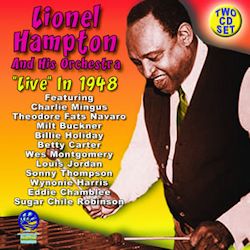Disc 1
1 - Hot House
2 - Buck's Idea
3 - Where Or When
4 - Hey-ba-ba-re-bop
5 - Eli Eli
6 - Flying Home
7 - Tempo's Birthday
8 - Body and Soul
9 - Who Cares?
10 - Saxes On 5th Avenue
11 - Central Avenue Breakdown
12 - Gladys' Idea
13 - House of Blue Lights
14 - Stardust
15 - $13.50 Special
16 - Giddyup
17 - Midnight Sun
18 - Barnyard Boogie
19 - Ain't Nobody Here But Us Chickens
20 - Pickup On the Rebop Kick
21 - Asiatic Call
22 - Cherokee
23 - When Your Lover Has Gone
24 - Joe Louis Punch
Disc 2
1 - Muchacho Azul
2 - Long Gone Blues
3 - Charlie Cole's Boogie Woogie
4 - Don't Blame Me
5 - But Beautiful
6 - Always
7 - How High the Moon
8 - Adam Blew His Hat
9 - The New Look
10 - I Know That You Know
11 - I Cover the Waterfront
12 - There's Good Rockin' Tonight
13 - Barnyard Boogie
14 - Central Avenue Breakdown
15 - The Man I Love
16 - Brant Inn Boogie
17 - Hawk's Nest
18 - Lady Be Good
19 - Body and Soul
20 - Satchmo's Blues
21 - Dues in Blues
22 - Beulah's Boogie
23 - Calling Doctor Mancuso
24 - Jay Bird
25 - Re-bop
Lionel Hampton and his Orchestra
Recorded live in 1948 [73:10 + 74:43]
The tracks here come from broadcasts Lionel Hampton and his band made over the airwaves of the Mutual Broadcasting System (MBS), Treasury
Department-sponsored programmes designed to promote Security Bonds. They were broadcast weekly and this selection captures dates from May to October 1948.
These were 15-minute broadcasts and the first thing to note is that whether because of the loss of material or to omit duplication, they’re not all intact.
Some dates sport only two tracks, the penultimate October broadcast only one track whilst others have a full, programme-busting seven tracks. None of these
matters are addressed in the notes because this series has no notes, only a full discography.
The band was caught in the Howard Theatre, Washington DC. In the first cut, from 1 May the rhythm section is heroically over-recorded and imperfect
balances sometimes results – this is a problem that recurs intermittently and so if your criteria of a good time is great recorded sound you won’t want to
sully your ears with this twofer. Most of the rest of us can put up with a few demerits of this kind to enjoy the crowd-pleasing rabble-rousers and
vitality engendered by Hampton’s band. At this time it included a stellar trumpet section – Fats Navarro, Teddy Buckner, and Wendell Culley included – a
trombone section led by Britt Woodman and a weaker sax line-up, though it was anchored by the mighty baritone of Charlie Fowlkes.
There are the usual complications of live broadcasting material – spoken introductions have to speed up or are cut short, as are the outros, and audience
applause is cut off. There are some good guests – Louis Jordan, who fits in nicely, semi-forgotten singer-pianist Sugar Chile Robinson, Wynonie Harris and
then two singers more urgently to be recommended – Billie Holiday singing I Cover the Waterfront and Betty Carter singing Hamp’s Jay Bird.
The main problem of sets of this kind is lack of time. Three, even four minutes doesn’t give a band like this much time to stretch out and the solos tend
to be hurried and to lack true individuality. The use of a band within a band is good - not least because the aggregation rose to include no fewer than 23
players – and one can concentrate on individual qualities though these are rare examples of this sub-group. In the main and despite the arrival of Wes
Montgomery and Milt Buckner, solo contributions remain muted. The best of the band comes in the final two tracks from October 1948 - Jay Bird,
where Carter’s scatting is virtuosic-plus – and Re-Bop which is fiery but controlled.
We have here strong but inconsistent performances and partial representations of Hampton’s band on the wing in 1948. Compromises were inevitable in
material of this kind, so if one listens in that spirit the bitty nature of the enterprise won’t disappoint.
Jonathan Woolf
